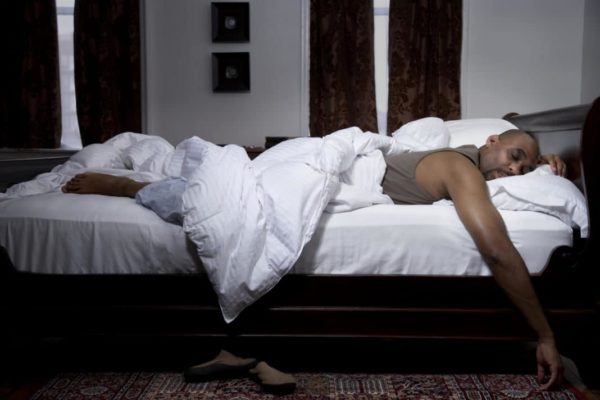Getting more than the recommended eight hours of shut-eye may affect stroke risk differently in people of different races, according to a new study.
A report published in the journal Neurology found that white men who sleep nine or more hours a night have a 70 percent higher chance of suffering a stroke. African-American men don’t face the same risk, however, and appear to even be protected by getting less than six hours of sleep each night.

According to the study, Black men who got less than the recommended 8 hours of sleep were at a decreased risk of suffering a stroke. (Sean Justice / Getty Images)
Both Black and white women were unaffected, regardless of whether they were long sleepers or not, according to the report.
“More research is needed to determine the mechanisms behind these relationships,” said study author Dr. Virginia Howard of the University of Alabama. “In the meantime, this emphasizes how important it is to better monitor and control cardiovascular risk factors in middle-aged to older people who have long sleep periods.”
For the study, researchers followed nearly 17,000 participants with an average age of 64 who had no history of stroke or breathing issues during sleep. Participants were followed for an average of six years and asked how many hours of sleep they got each night — on work days and non-work days. In the end, 460 people had suffered a stroke, with 288 in white participants and 172 in Black participants.
Moreover, the study found that Black men who slept less were about 80 less likely to have a stroke compared to Black men who got an average night’s sleep. Meanwhile, white men who slept longer were at a 70 percent higher risk of stroking out compared to average sleepers.
Researchers said sleeping too long could be a sign of a health issue in white men but noted the increased stroke risk may also be linked to an unhealthy, sedentary lifestyle ” through greater time spent in bed and less energy expenditure.”
In their study, researchers also adjusted for other factors that could affect stroke risk, including smoking status, diabetes and heart disease.
Virend Somers, M.D., Ph.D., of the Mayo Clinic in Rochester, Minnesota, told MedPage Today she was surprised at the study’s findings, calling them “unexpected.”
“It’s very surprising that they found that African-American men who slept 6 hours or less seemed to have a lower risk of stroke. This is not what one would have predicted based on the literature,” said Somers, who was not involved in the research. “The study is very well done, yet the data don’t fit with our expectations — which is always intriguing and exciting because that means there’s more to the story than we thought.”


